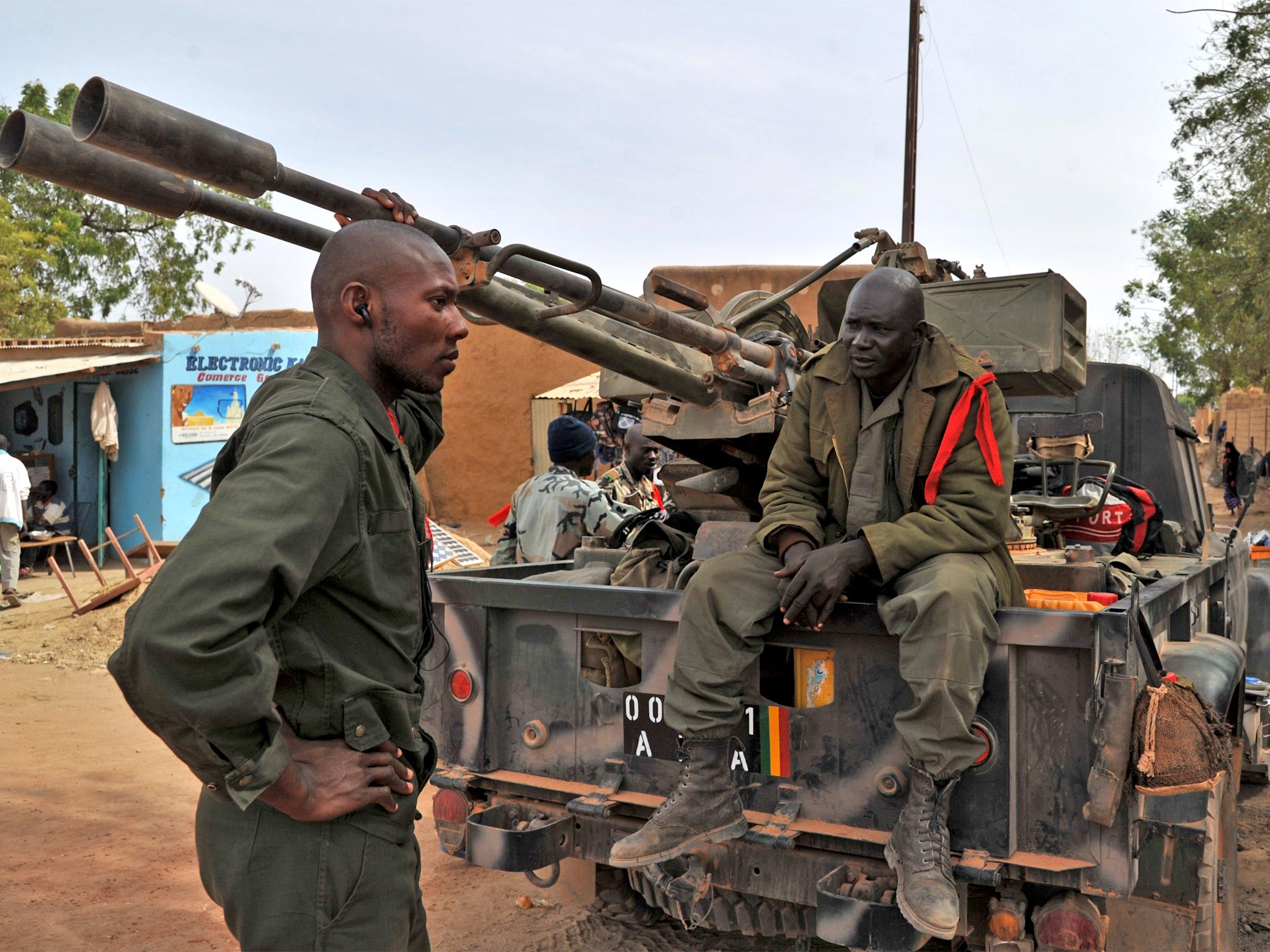After the bombs, Mali hunts for the enemy within
The hunt is on in Mali for fugitive rebels who have gone into hiding

Your support helps us to tell the story
From reproductive rights to climate change to Big Tech, The Independent is on the ground when the story is developing. Whether it's investigating the financials of Elon Musk's pro-Trump PAC or producing our latest documentary, 'The A Word', which shines a light on the American women fighting for reproductive rights, we know how important it is to parse out the facts from the messaging.
At such a critical moment in US history, we need reporters on the ground. Your donation allows us to keep sending journalists to speak to both sides of the story.
The Independent is trusted by Americans across the entire political spectrum. And unlike many other quality news outlets, we choose not to lock Americans out of our reporting and analysis with paywalls. We believe quality journalism should be available to everyone, paid for by those who can afford it.
Your support makes all the difference.“Look at him, a baby terrorist, they get them young and send them to kill the people,” said the policeman, shaking his charge by the shoulder. “Most of them are caught like this one, but the people who sent him don’t care.”
The young prisoner looked terrified. “I did not do anything, I was just trying to find my cousin when this…” he said, spreading his hands in a gesture of hopelessness. His name is Jalu Traoere, 17 years old but looking a lot younger, arrested on the road between the towns of Niono and Markala, in the Ségou Region of Mali. He insisted he was trying to find his family, who were refugees from the north.
His misfortune was that he was coming from the direction of Diabaly, which had fallen to Malian and French troops. And, as the policemen who arrested him knew only too well, the route would be full of Islamists trying to escape and some of them trying to infiltrate and sabotage.
The cruel regime imposed by the rebels in territories they hold in the north, the brutal application of Sharia law, and the threats of jihad and retribution had led to a sense of trepidation in the rest of the country. And with it has come a search for the enemy within, with the innocent caught up on the trawl as well as the guilty.
Was there any proof that Jalu was an Islamist? “He gave himself away when we questioned him, he changed his story. There is suspicion to detain him further. Don’t be fooled because he is so young, he would have grown a big beard as soon as he could,” said the sergeant pushing into the back of a van.
Sitting inside was another suspected Islamist who looked to be aged in his late 20s. He too had been travelling on the road, he too was without a beard. “Ah,” nodded the sergeant knowledgably, “he has shaved it off to fool us, they often do that.” As they drove away he offered assurance: “If they are not guilty they will surely be freed.”
The anger towards the Islamists is understandable, and just over an hour’s drive away there were many in Diabaly who had suffered during the brief sojourn of the Islamists, and were happy for rough justice to be meted out.
Lassana Kanduku found the body of his brother Shekan shot dead by Islamists, and dug a grave to bury him. He said that if he could, he would hunt down the killers.
“I am hoping the two men who carried out this murder did not get away but were caught by the French and our troops. If they were caught I want them hanged. If our family catch them they would become dead.”
Are the often arbitrary arrests not pouring oil on an already inflammatory situation? Joseph Diawara, a police prefect in Segou, the principal city in the region, and the second largest in the country, acknowledged the risk.
“We are not just holding people because they are from the north – we don’t want to start a civil war,” he said. “But the Islamists are definitely trying to send in people secretly to carry out attacks here. We have caught people with weapons, we have information that some of them have been hired in Gao [in the rebel-held north] to do these things. There are 160 [extended] families from the north living just in this city. They have family members joining them all the time, of course this gives the Islamists an opportunity to send people.”
Outside the Missiriba mosque in the city, worshippers gathering for prayer were soon in animated discussion about the threat of infiltrators. “Of course this is taking place, that is how they start to gain control,” cried Mohammed Haidara. “You don’t want that to happen to your city, you must be careful.”
But Madibu Koroma cautioned: “You know the Islamists were helped to rise by people in government who wanted to use them against the Tuaregs. We must be careful now not to believe everything they tell us. I hate what the Islamists are doing, but you cannot say someone’s a terrorist because he has a beard. Don’t forget it’s the foreign Islamists who are the main problem.”
Standing in the corner, Ibrahim Sidibe was keeping his own counsel. He was pointed out as someone whose nephew had been detained. “We are hoping to get him out soon so I have to be careful what I say. I am from Kidal, we were the first place the Islamists took over, we have suffered very much in their hands. But I have to be careful of what I say because people are nervous and when people are nervous there can be misunderstandings and people get hurt.”
Join our commenting forum
Join thought-provoking conversations, follow other Independent readers and see their replies
Comments